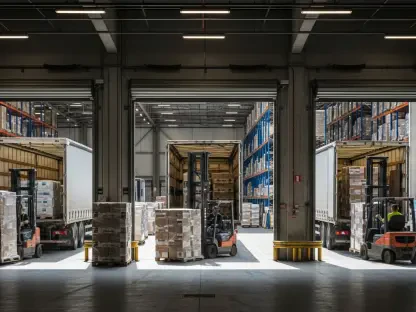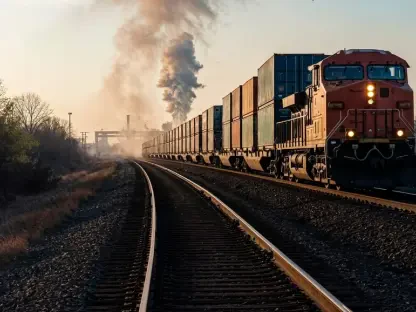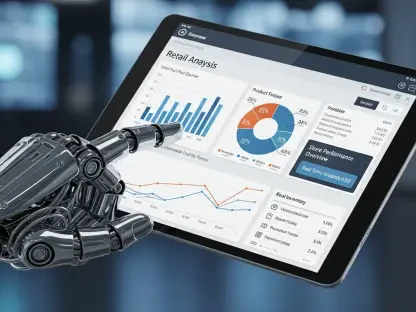What if the future of Europe’s logistic efficiency lay in the intricate dance of technology and last-mile delivery? As cities across Europe grapple with clogged roads and rising emissions, the last mile—where packages make their final journey to consumers—is emerging as a battleground for change. Visionary stakeholders, from startups to established logistics giants, are looking to technology to redefine how goods reach consumers, leaving a footprint that is both efficient and sustainable.
Embracing Change in Chaotic Times
The rapid expansion in e-commerce has placed unprecedented pressure on European cities, where the urgency to innovate extends beyond operational metrics. The last mile is marred by mounting environmental concerns, demanding Europe pivots not only to alleviate urban traffic but to meet global sustainability goals head-on. As the world becomes increasingly interconnected, the shift from traditional logistic models to cutting-edge solutions becomes a necessity, driven by consumer expectations and the stark reality of ecological imperatives.
Pioneering Technological Catalysts
Technological advancements are the heartbeat of this transformation. Artificial intelligence and automation have become the cornerstone in refining logistics frameworks by revolutionizing predictive logistics and optimizing route planning. Startups and industry veterans alike are harnessing AI’s power to minimize delivery times and maximize efficiency, crafting smarter logistics ecosystems that respond dynamically to consumer demands. Coupled with automation, parcel sorting and fleet management processes are undergoing a metamorphosis, promising more precise and reliable deliveries.
Simultaneously, the rise of sustainable solutions, such as electric vehicles and eco-friendly strategies, showcases a collective commitment to green initiatives. European companies are investing in circular logistics that emphasize waste reduction and resource optimization. The push toward greener fleets is not merely a trend but a conscious response to the call for environmentally responsible supply chains, enhancing both brand image and operational savings.
Meanwhile, urban logistics face infrastructural bottlenecks that call for innovative approaches. Drone technology and autonomous vehicles promise to disrupt traditional delivery models, providing solutions to highway congestion and delivery inefficiencies. These advancements emphasize the need for versatile logistics frameworks capable of adapting to evolving urban landscapes.
Illuminating Change Through Collaborative Insight
Industry leaders, like Bernhard Bukovc, are more than passive observers in this transformation. Their advocacy for integrating cutting-edge solutions reflects a broader trend in logistics that thrives on collaboration. Insights from events such as the Last Mile Leaders gather various stakeholders, uniting seasoned logisticians with agile startups. Through shared knowledge and strategies, the sector’s narrative is continuously being rewritten, aided by the networking power and insight-rich conversations fostered at these gatherings.
“Supporting innovators is the key to keeping ahead,” noted Bukovc, reflecting on the collective push towards future-proof logistics operations. These insights are not confined within industry walls but are shared across sectors, highlighting a growing necessity for cross-industry partnerships that spread knowledge and share innovation.
Laying Foundations for Future Success
Strategically implementing these technological breakthroughs defines the future landscape of last-mile delivery. Integrating AI into logistic operations pushes not only for faster deliveries but an era where customer satisfaction aligns with operational prowess. Investment in infrastructure that supports sustainable energy and technology-rich environments signals the maturation toward resilient urban settings.
The role of partnerships cannot be overstated—collaborative frameworks established across sectors enrich resource allocation and accelerate innovation. These alliances represent a unified front, underscoring sustainability and technological ingenuity as primary strategic pillars in transforming Europe’s delivery framework.
Looking Forward: A New Epoch in Logistics
The potential for technology to transform Europe’s last-mile delivery has been recognized, catalyzing broader shifts in operational practices and strategic approaches. By the end of the first half of this year, European startups had acquired approximately $4.5 billion in deals, driving innovation and setting a global benchmark for logistics transformation. These developments have not only expanded the market but have also set precedents for sustainable, efficient logistics.
Agreements and strategies established during pivotal events like the Last Mile Leaders have laid the groundwork for a logistics ecosystem primed for future challenges. This intersection of ideas and technologies ensures that as Europe continues navigating its urban landscapes, it can embrace an era of sustainable, efficient, and intelligent last-mile solutions.









